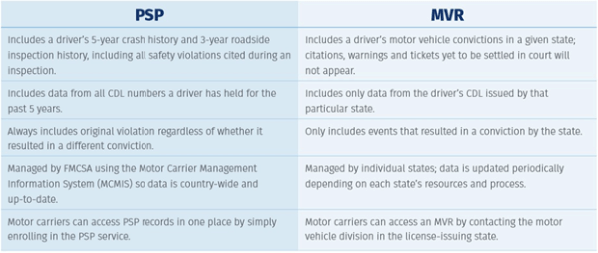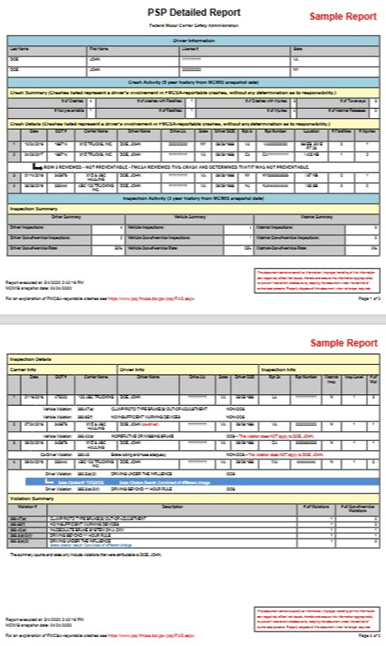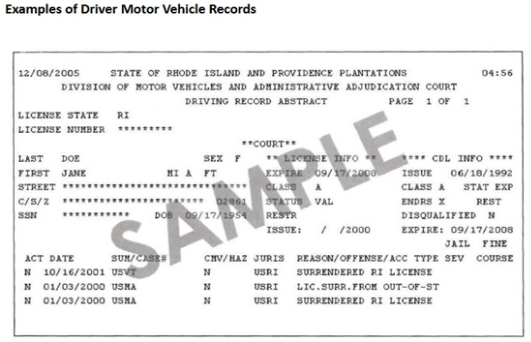According to FMCSA, the Pre-Employment Screening Program (PSP) provides motor carriers, individual drivers, and industry service providers access to commercial drivers’ safety records from the Federal Motor Carrier Safety Administration’s (FMCSA) Motor Carrier Management Information System (MCMIS). Records are available 24 hours a day via the PSP website.
In other words, PSP is a program that provides motor carriers and other interested parties with access to violation and crash history of regulated drivers to aid in making employment decisions.
The Federal Motor Carrier Safety Administration’s Pre-Employment Screening Program (PSP) will help you screen applicants for driving positions more successfully, whether you are a driver, the owner of a trucking firm, a safety director, or a driver recruiter.
There is no doubt that motor vehicle records, as well as background checks are useful. However, they may not often give specific information on a driver’s previous job history or a history of DOT violations and crashes. The Pre-employment Screening Program provides data that can assist employers in making better choices when hiring drivers, and also to comply with § 391.23 Investigation and inquiries
Order a PSP along with your MVR and CDLIS report at Screeningwise
Motor carriers can order a potential driver’s three-year roadside inspection history and five-year crash record with the help of PSP. The PSP report contains data from the Motor Carrier Management Information System on hours-of-service violations, drug or alcohol violations, accidents that needed to be reported according to DOT regulations, and other data from the MCMIS (Motor Carrier Management Information System).
Why Was the PSP Developed?
In the Safe, Accountable, Flexible, Efficient Transportation Equity Act: A Legacy for Users, Title 49 U.S. Code, section 31150, Public Law 109-59 Section 4117 (SAFETEA-LU), Congress mandated the creation of a system to make safety performance data electronically accessible for pre-employment screening reasons.
FMCSA believes that employers can make better informed hiring decisions with the help of this program as PSP enables faster access to information on commercial driver safety performance than other methods. And there is even an FMCSA safety impact study, clearly demonstrating the benefits of the program. The study shows that the employers enrolled in the PSP program lowered their crash rate by 8% and driver out-of-service rates by 17%.
Info That Appears on a PSP Report
A PSP record shows a driver’s most recent 5 years of crash data and the most recent 3 years of roadside inspection data from the FMCSA MCMIS database. MCMIS, the Motor Carrier Management Information System we mentioned earlier, is a federal government database, different from the state data sources used to generate Motor Vehicle Records (MVRs).
This document shows details about the company that the driver was working for at the time of the crash or inspection. Additionally, it displays the time and place of the crash or inspection. Injuries, deaths, and towaways are among the additional safety information concerning crashes that is provided. Inspections reveal information similar to whether a vehicle was taken out of service.
Following a data review request, the PSP record may be modified to indicate a judgment that an accident was not avoidable or to show that a driver was guilty of a different offense.
It is important to mention that the PSP record does not display a score.
Based on the most recent data load from MCMIS into the PSP system, the record represents a snapshot in time. About once a month, a fresh snapshot is added. The current snapshot date is displayed on the PSP home page.
What Is the Difference Between PSP and MVR?
Different data is available in a PSP report from the Federal Motor Carrier Safety Administration (FMCSA) and a state motor vehicle record (MVR). When considering hiring a commercial driver, it’s crucial to look at both of these. Now, let’s compare the two.

Contents of a PSP Report
- A driver’s identification details. This comprises the person’s full legal name, DOB, driver’s license number, and issuing state.
- DOT-recordable crash data for the past five years
- Roadside Inspection Data for three years

Contents of a Motor Vehicle Report (MVR)
Employee driving records can be obtained from the Department of Motor Vehicles in a given state by requesting a “Motor Vehicle Record” (MVR). Although it shares some similarities with MCMIS, its data comes from a different source. An MVR may usually be found by checking the state DMV’s website. A three-year MVR history is required by the FMCSA for any commercial vehicle operator.
The information included in the MVR includes:
- A driver’s identification details. This comprises the person’s full legal name, DOB, driver’s license number, and issuing state.
- A driver’s license’s current status (valid, suspended, etc.)
- All CDL Endorsements and Restrictions (Endorsements refer to Class A, HAZMAT, Motorcycle and restrictions to glasses or hearing aids).
- The driver’s history of suspensions or disqualifications.
- Driving violation convictions.

How Can a Motor Carrier Use a PSP Report?
The PSP is an optional program, which means that the FMCSA does not force motor carriers to use it as part of their driver employment program. Carriers that want to participate in the PSP program must enroll first, and they can only access PSP information “for the purpose of conducting pre-employment screening and with the driver’s written consent.” To gain a driver’s permission to view their PSP records, carriers must utilize a special authorization form. Carriers (or their third-party service provider, like InOut Labs) are provided credentials to access the PSP online service, where they can get their PSP records.
To streamline the process Order a PSP along with your MVR and CDLIS report at Screeningwise
Carriers that opt to participate in the PSP frequently use its data to verify whether potential drivers match their minimum qualification criteria as part of their driver employment process. Carriers frequently establish minimum requirements that candidates must satisfy in order to be considered for employment. A carrier may decide to hire only drivers who have had fewer than a specific number or kind of safety violations or crashes in the previous two years. Getting a PSP report as part of a driver’s employment process helps confirm that the candidate fulfills that criterion.
Like we mentioned before, PSP use is entirely optional, and not every carrier chooses to utilize it. Nonetheless, many carriers, particularly big companies, enrolled and use it together with other mandatory reports such as the MVR checks.
How to Enroll in the FMCSA PSP
Register an account with Screeningwise. At Screeningwise, you can order a PSP, MVR and add a CDLIS search with only a few clicks.
How Much Does It Cost to Have Access to PSP?
Driver pre-employment reports are only accessible from NIC Federal, the FMCSA’s designated vendor.
- MVR: $6 plus state fees at cost, where applicable.
- PSP Search: $20
- CDLIS Search: $6
Final Words
The FMCSA PSP is a screening tool that enables motor carriers and individual drivers to acquire driving records from the FMCSA’s Motor Carrier Management Information System (MCMIS). A PSP report includes the most recent 5 years of crash data and the most recent 3 years of roadside inspection data on CDL drivers from the FMCSA MCMIS system. Major safety violations are also included in the report. The MCMIS system only includes commercial drivers who have had accidents and/or roadside inspections. The PSP program is voluntary. Many motor carriers have enrolled in the program and use the PSP reports as part of their employment process.
